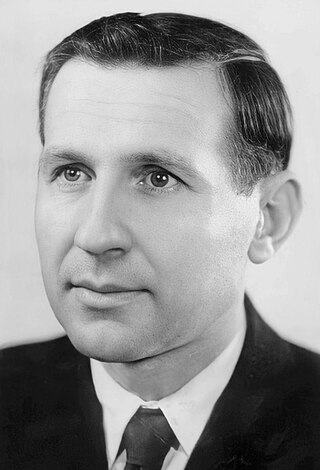
Ramiz Tafë Alia was an Albanian politician serving as the second and last leader of the People's Socialist Republic of Albania from 1985 to 1991, serving as First Secretary of the Party of Labour of Albania. He was also the country's head of state from 1982 to 1992. He had been seen as a successor by Enver Hoxha and took power after Hoxha died.

Mehmet Ismail Shehu was an Albanian communist politician who served as the 23rd Prime Minister of Albania from 1954 to 1981.

Burrel is a town in northern Albania, 91 km from Tirana. At the 2015 local government reform it became a subdivision and the seat of the municipality Mat. It was the seat of the former District of Mat. The population at the 2011 census was 10,862.

Fatos Thanas Nano is an Albanian socialist politician who served as Prime Minister of Albania in 1991, from 1997 to 1998 and from 2002 to 2005. He was the first leader and founder of the Socialist Party of Albania and a member of the Albanian Parliament from 1991 to 1993 and 1997 to 2009. He reformed the anti-revisionist Marxist-Leninist ideology of the Labor Party of Albania into social democracy for its successor, the Socialist Party. During his leadership, the Socialist Party, as a result of reforms, joined the Socialist International and Party of European Socialists. Nano was a candidate in the 2007 presidential election but did not win. He again tried in the 2012 presidential election, but he did not even qualify as a candidate, because the leaders of parties in Parliament obstructed their respective MPs to elect him as candidate in the elections.

A labor camp or work camp is a detention facility where inmates are forced to engage in penal labor as a form of punishment. Labor camps have many common aspects with slavery and with prisons. Conditions at labor camps vary widely depending on the operators. Convention no. 105 of the United Nations International Labour Organization (ILO), adopted internationally on 27 June 1957, abolished camps of forced labor.

Gęsiówka is the colloquial Polish name for a prison that once existed on Gęsia ("Goose") Street in Warsaw, Poland, and which, under German occupation during World War II, became a Nazi concentration camp.

Penal labour is a term for various kinds of forced labour which prisoners are required to perform, typically manual labour. The work may be light or hard, depending on the context. Forms of sentence involving penal labour have included involuntary servitude, penal servitude, and imprisonment with hard labour. The term may refer to several related scenarios: labour as a form of punishment, the prison system used as a means to secure labour, and labour as providing occupation for convicts. These scenarios can be applied to those imprisoned for political, religious, war, or other reasons as well as to criminal convicts.
Current issues concerning human rights in Albania include domestic violence, isolated cases of torture, and police brutality, the general condition of prisons, human and sex trafficking and LGBT rights.
After the end of World War II, the Central Labour Camp in Potulice became a detention centre for Germans and anti-communist Poles. It was set up by the Soviet and Polish Communist authorities in Potulice in place of the former Nazi German Potulice concentration camp, the subcamp of Stutthof built in 1941. Following liberation by the Red Army, the camp was controlled by the Soviet NKVD Department of Prisoners and Internees until June 1945. Repopulated, it remained in operation until 1949 under the management of the Stalinist Ministry of Public Security of Poland.
Czesław Gęborski was a captain of the security forces of the People's Republic of Poland. He is best known for his role as commander of the Łambinowice transfer and internment camp created in the former German Stalag VIII-B. In October 1945 he was dismissed from the post and charged with setting fire to one of the barracks in the camp and ordering gunfire on the inmates trying to put out the flames, an incident in which 48 prisoners died.

The fall of Communism in Albania, the last such event in Europe outside the Soviet Union, started in December 1990 with student demonstrations in the capital, Tirana, although protests started in January that year in other cities like Shkodra and Kavaja. The Central Committee of the communist Party of Labour of Albania allowed political pluralism on 11 December and the largest opposition party, the Democratic Party, was founded the next day. March 1991 elections left the Party of Labour in power, but a general strike and urban opposition led to the formation of a "stability government" that included non-communists. Albania's former communists were routed in elections in March 1992 amid economic collapse and social unrest, with the Democratic Party winning most seats and its party head, Sali Berisha, becoming president.

The Haidari concentration camp was a concentration camp operated by the German Schutzstaffel at the Athens suburb of Haidari during the Axis occupation of Greece in World War II. Operating from September 1943 until it was shut down in September 1944, it was the largest and most notorious concentration camp in wartime Greece, becoming known as the "Bastille of Greece".
Burrel Prison is a high security prison located outside the town of Burrel, in northeastern Albania at the District Police Station in Mat with a maximum capacity of 198 inmates. In 2011 the prison housed 182 inmates and employed 120 corrections officers. The one-story structure is divided into three areas covering 21,000 square meters.
Lenka Çuko is an Albanian former politician of the Albanian Party of Labour (PPSh).

Muho Asllani is a former Albanian politician of the Albanian Party of Labour (PPSh). He was a member of the Politburo, a representative in the Albanian Parliament for many years, First Secretary of Party in several districts, and member of the Cabinet of Albania during 1976-79.

Qirjako Mihali was an Albanian politician of the Albanian Party of Labour. He was a candidate-member of the Politburo of the Party of Labour of Albania, Minister of Finance, and member of the Albanian Parliament.

Kiço Mustaqi was a former Albanian general and politician of the Albanian Party of Labour. He served as Chief of the General Staff of Albanian People's Army, the last Minister of Defence of the communist era in Albania, and was a member of the Politburo.
Pirro Kondi was an Albanian politician of the Albanian Party of Labour (PPSh). Coming from a family with strong communist background, he became member of the Albanian Parliament and a candidate-member of the Politburo of the Party of Labour of Albania by the '80.
Pirro Dodbiba (1925–2004) was an Albanian politician of the Albanian Party of Labour (PPSh). Although the nephew of Sokrat Dodbiba, former Minister of Finance in the quisling government of Rexhep Mitrovica during World War II who died in communist prisons, he chose from the beginning the opposite path joining the National Liberation Movement. He served as Party's representative in various places in Communist Albania, and by early 1970s became candidate-member for the Politburo of the Party of Labour of Albania, the highest political ruling entity of that time.

Ernest Simoni Troshani is a cardinal of the Roman Catholic Church from Albania.













